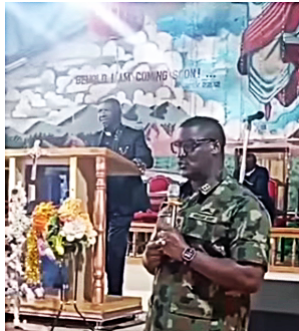
A pastor in Nigeria is facing death threats for speaking out on Islamic extremist attacks on Christians and calling for protection against “genocide.”
The Rev. Ezekiel Dachomo, based in Plateau state as regional chairman of the Church of Christ in Nations (COCIN) in Barkin Ladi, told reporters in Jos on Oct. 24 that Islamic extremists have marked him for assassination for calling on the Nigerian and U.S. governments to help protect Christians against genocide.
“My life is in grave danger. Even as I speak, I am on the lookout for attacks,” he reportedly said. “I no longer sleep with my eyes closed. I have been attacked before but escaped.”
The statements followed an Oct. 15 video of Pastor Dachomo standing in a mass grave with the bodies of at least 12 slain church members criticizing the Nigerian government for denying genocide against Christians and seeking help from the U.S. administration, the U.S. Senate and the United Nations. The bodies in the mass grave were reportedly those of Christians killed by suspected Fulani herdsmen in Rachas village, Heipang District, and Rawuru village in Fan District.
“The Nigerian government keeps denying that there’s no genocide against Christians in Nigeria, but look at the corpses that were killed today,” Dachomo said. “I’m calling on President Trump of America to please save our lives in Nigeria. Just as he intervened in the conflict between Israel and Hamas, I’m calling on his attention to Nigeria. Christians are being massacred. They claim Muslims too are being killed, but the question is they’re being killed by whom? By Muslims of course!”
Pastor Dachomo said in his Oct. 24 statements that the video and his assertions of genocide have led to the threats on his life. He said military officials have also threatened him for asserting that they declined to respond to reports of impending attacks on communities in Barkin Ladi.
“Even the Nigerian Army issued a press release against me, accusing me of inciting people,” Pastor Dachomo said, according to the The Daily Post. “But they are the ones inciting the Muslims against us by refusing to make arrests. This is what we are facing, and we have now resorted to self-defense; otherwise, the name of Jesus will not be mentioned again in our land.”
Saying he has received threats through phone calls, messages and on social media, Pastor Dachomo said he made the video also for future generations to see how Christians were terrorized and persecuted as part of a genocide.
A Nigerian Army representative recently appeared in Pastor Dachomo’s church and pledged to protect him, and U.S. President Donald Trump has vowed to use military force against Islamic terrorists in Nigeria. Analysts doubt such intervention is likely soon, and some believe it would play into the hands of Islamic extremists seeking to destabilize the country through all-out war.
Pastor Dachomo continues to face threats, including an unconfirmed report of Islamic extremists vowing on Nov. 7 to kill him within seven days. The pastor has released a video in which he said his martyrdom would help grow Christ’s kingdom.
“I already told my family, my [church] members that if they [terrorists] kidnap me, nobody should contribute one kobo [a cent, for ransom],” Pastor Dachomo said. “My grave will speak, my blood will raise war that will lead to Christian liberation.”
Genocide Case
Christian leaders in northeast Nigeria recently chronicled anti-Christian violence in the Gwoza area of Borno state in response to a claim by an area Muslim senator that no genocide is being committed against Christians in the state.
In a statement aired on national Channels TV, the leaders listed a series of targeted attacks and killings by Islamic State West Africa Province (ISWAP) and Boko Haram as well as government policies that have marginalized Christians in Borno state.
“Gwoza once had a thriving Christian presence. Before the insurgency [began in 2009], there were more than 176 large church buildings across the local government. Today, 148 of those churches were burnt and lie in ruins,” stated the Rev. Filibus Goma, former president of the Church of the Brethren (EYN) and chairman of the Board of Trustees of Gwoza Christian Community Association (GCCA), along with the Rev. Ayuba John Bassa, national coordinator of the association, in a statement entitled, “The Unspoken Genocide: GCCA Account on Christian Persecution in Gwoza, Borno State.”
“Christian communities have been denied land for places of worship; mosques are built freely. Before Boko Haram, civil service representation in Gwoza was roughly 5 percent Christian to 95 percent Muslim despite an almost equal population. Muslims have dominated political offices and traditional titles because honest, free elections in Gwoza have effectively never taken place.”
Christian Religious Knowledge is no longer taught in government schools across their local government, they noted.
The human cost of Islamist attacks is staggering, they reported.
“Today, about 107,000 Gwoza Christians are scattered in 27 internally displaced persons camps across seven Nigerian states and in the Minawao refugee camp in Cameroon,” they stated. “Another 50,000 are squatting with relatives in towns and cities across Nigeria.”
Many Christians have lived as Internally Displaced Persons (IDPs) or refugees for more than a decade with little or no government assistance and no realistic prospect of returning home, they reported.
“This pattern – destruction of churches, removal of Christian families, and official silence or inaction – raise an unavoidable question: Is there a systematic attempt to erase Christians and their heritage from Gwoza?” they stated. “Reconstruction has been highly uneven. Hundreds of Muslim homes have been rebuilt and thousands rehabilitated on their original land, while virtually no Christian homes have been restored. Of the thousands of resettlement houses built, we know of only three beneficiaries who are Christian.”
To those who dismiss or minimize these crimes, they posed the question: “If Christians are accused of being perpetrators, who are the suspects? Do attackers call on the name of Jesus while killing?”
In Gwoza, Christians have never waged attacks on Muslims; churches were being destroyed even before the insurgency consolidated, they stated.
“These are not isolated incidents but part of a broader, violent pattern that must be acknowledged and investigated,” they stated. “We plead for truth, accountability and action.”
Nigeria remained among the most dangerous places on earth for Christians, according to Open Doors’ 2025 World Watch List of the countries where it is most difficult to be a Christian. Of the 4,476 Christians killed for their faith worldwide during the reporting period, 3,100 (69 percent) were in Nigeria, according to the WWL.
“The measure of anti-Christian violence in the country is already at the maximum possible under World Watch List methodology,” the report stated.
Christian leaders in Nigeria have said they believe herdsmen attacks on Christian communities in Nigeria’s Middle Belt are inspired by their desire to forcefully take over Christians’ lands and impose Islam as desertification has made it difficult for them to sustain their herds.
In the country’s North-Central zone, where Christians are more common than they are in the North-East and North-West, Islamic extremist Fulani militia attack farming communities, killing many hundreds, Christians above all, according to the report. Jihadist groups such as Boko Haram and the splinter group Islamic State in West Africa Province (ISWAP), among others, are also active in the country’s northern states, where federal government control is scant and Christians and their communities continue to be the targets of raids, sexual violence, and roadblock killings, according to the report. Abductions for ransom have increased considerably in recent years.
The violence has spread to southern states, and a new jihadist terror group, Lakurawa, has emerged in the northwest, armed with advanced weaponry and a radical Islamist agenda, the WWL noted. Lakurawa is affiliated with the expansionist Al-Qaeda insurgency Jama’a Nusrat ul-Islam wa al-Muslimin, or JNIM, originating in Mali.
Numbering in the millions across Nigeria and the Sahel, predominantly Muslim Fulani comprise hundreds of clans of many different lineages who do not hold extremist views, but some Fulani do adhere to radical Islamist ideology, the United Kingdom’s All-Party Parliamentary Group for International Freedom or Belief (APPG) noted in a 2020 report.
“They adopt a comparable strategy to Boko Haram and ISWAP and demonstrate a clear intent to target Christians and potent symbols of Christian identity,” the APPG report states.
Nigeria ranked seventh on the 2025 WWL list of the 50 countries where it is most difficult to be a Christian.






